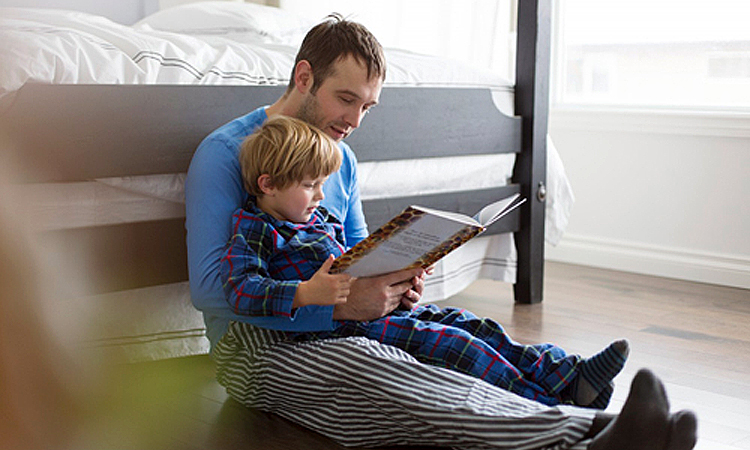Books were ever-present in my boyhood home, housed in three large bookcases that stood tall in the living room like barricades against ignorance. Within arm’s reach was everything from the multivolume Encyclopedia Americana to a frayed edition of Robinson Crusoe, a family heirloom that had been a Christmas gift to my great-grandfather in 1877.
When I was a young child, my mother and grandmother read to me often. I thought of it then as entertainment. Now I know it was much more. Those experiences planted seeds in my brain that not only fostered my imagination and lifelong interest in books but also built neural connections that would have a major impact on my ability to learn, speak, write, and discover the world.
As research has since proven, there are numerous benefits of reading to your children. These experiences create an estimated 1,000 trillion synapses in the brain – junctions that allow signals to be passed from one neuron to another. External stimulation is especially important at this age because the brain is very active and therefore highly receptive to new learning. As childhood education expert Pam Schiller noted in the journal Brain Development, “The brain of a three-year-old is two-and-a-half times more active than an adult’s.”
Here are 7 ways that reading helps wire young brains for a future of greater learning and achievement:
1. It provides an important human connection.
The nurturing aspect of sitting on a parent’s lap while being read to provides a comforting bonding experience that transcends mere diversion or education.
2. It establishes associations between pictures and words.
Even infants only a few months old are capable of looking at pictures and listening to your voice. Pointing at pictures and describing them contribute to the wiring process that connects images to words and helps a child recognize the importance of language.
3. It builds neural connections through repetition.
Reading on a daily basis helps strengthen initially fragile connections among neurons into ones with staying power. If your child wants to hear the same book many nights in a row, hang in there. What’s boring for the storyteller may serve the child’s emotional needs at the time.
4. It fosters imagination.
It’s a lot easier to see yourself as a heroic character in an exotic location after meeting characters in books. I was so enthralled by books as a kid that sometimes I’d imagine my backyard transformed into a giant page, where I could roam as an explorer I had met in print.
5. It helps children make sense of the world.
Children’s curiosity is fueled by stories they hear, and these stories expand their vocabulary and knowledge to help them better navigate the world around them and determine how they fit into it.
Stories taught me about cause and effect and whetted my appetite to find out why things happened the way they did. As a preschooler I would follow my mother around the house, barraging her with questions about animals and countries and clouds like a pint-sized news reporter. She patiently listened and answered me. My curiosity about the world hasn’t wavered since.
6. It builds language skills.
According to Reading Is Fundamental, an organization devoted to promoting literacy, “Children learn to love the sound of language before they even notice the existence of printed words on a page.” Being read to helps build listening skills and concentration, both very important for social interaction.
Reading aloud also familiarizes children with the language of books, which is not the same as what they hear on TV or in daily conversations. Books are written with a more formal structure that helps program the brain to be more receptive to learning, especially in the classroom.
7. It establishes reading as something that’s fun, not a chore.
When the reader shows excitement, it enlivens the storytelling so it’s even more of a treat for kids. This fun factor can make it a lot easier for children to accept and embrace the reading that will be required of them in school.
Reading As Role Model
Even when I wasn’t reading or being read to, the act of reading was an important backdrop to my formative years. In my head I can still vividly see my mother drifting off to sleep mid-page or my grandmother in her favorite chair, book in hand, her beloved Siamese sleeping on an afghan draped over her legs.
It was a precious moment for me as an adult when I first read to my own child at bedtime. The comfort of books had come full circle.
Click here to see Rose’s tips for healthy and happy relationships



4 Comments
Rose Caiola
I remember reading as a young girl, and how it peaked my curiosity about the world and helped me better understand it. We have to encourage our children’s inquisitive nature and desire to learn. Being curious about the world opens endless paths for discovering and learning.